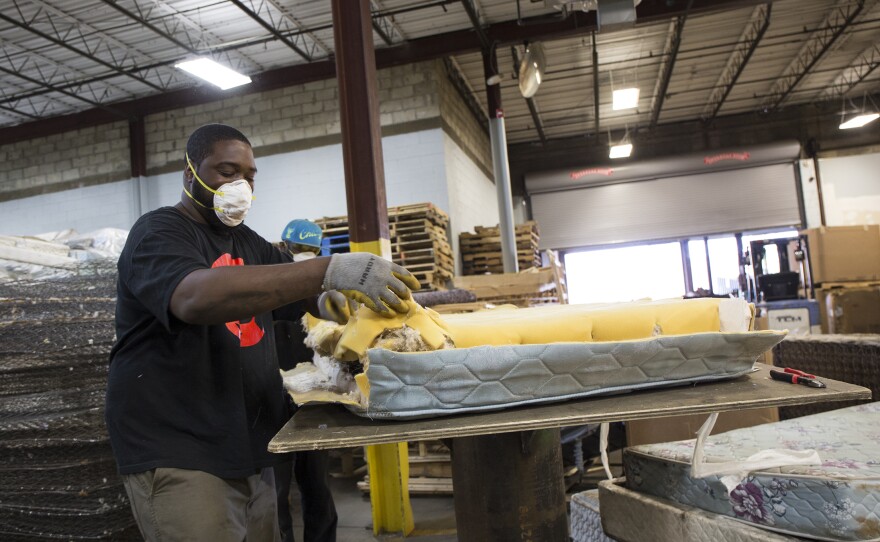Hartford was paying hundreds of thousands of dollars per year to pick up mattresses and break them apart for disposal.
If you've ever moved, you know how tricky it can be to transport a mattress. They're bulky, tough to carry, and take up lots of space. They're also really hard to throw out.
Now Connecticut is looking to solve that problem by introducing the nation's first-ever mattress recycling program. The goal is to get old beds off the curb and into the renewable waste stream.
A cavernous warehouse in Bridgeport is where mattresses go to die and then, get reborn.
It's called Park City Green, and as one of two mattress recycling facilities in the state, it employs workers who manually break down bedding parts: separating the materials into giant piles of foam, cotton, and tall stacks of metal springs.
All this will get shipped off to junk dealers, to be recycled and reclaimed for later use in the metal industry, or, in the case of foam, "that winds up on the backing of carpets," said Adrienne Farrar Houël, the group's president. "When you're buying carpeting by the meter or by the yard, you turn it over and you'll see multicolored, what looks like rubber on the back. That's recycled foam."
Farrar Houël said Park City Green has been recycling mattresses since 2012. Back then, her big suppliers were places like hospitals and universities.
Now, thanks to Connecticut's new mattresses recycling law, her clientele is expected to increase. Tom Metzner is with Connecticut's Department of Energy and Environmental Protection.
"The way it works is, it's financed through the purchase price. When you buy a mattress you're spending an extra nine dollars per piece," Metzner said.
That money from consumers goes to a private non-profit called the Mattress Recycling Council.
"Which is made up of mattress manufacturers. They use that money to hire transporters. To provide containers to transfer stations and to process the mattresses. But we want to make sure that people understand that the nine dollars does not go to the government. It is not a tax," Metzner said.
Metzer said taxes are how you used to get rid of mattresses: through things like "bulk waste" collection days or curbside pickup. Costly propositions for cities like Hartford. Marilynn Cruz-Aponte is with the city's department of public works.
"The problem of mattresses was huge. It was hard for residents to deal with them. It was costly for municipalities to deal with them. They were unsightly and they were everywhere," said Cruz-Aponte.

Cruz-Aponte said after Hartford's landfill closed in 2008, the city was paying hundreds of thousands of dollars per year to pick up mattresses on trash day and break them apart for disposal.
"Summer of 2010 I received my first invoice. It was $109,000 dollars for the first quarter of the year. And I went ahead and did the math and said, 'Mattresses are going to cost Hartford over $400,000? We have a problem," Cruz-Aponte said.
Eventually, she said the city got the cost down to around $180,000 annually, but with the new law in effect: "It will be be zero next year," Cruz-Aponte said, adding that the program will create more jobs.
Back at the Park City Green recycling facility in Bridgeport, Farrar Houël said she plans to hire two more employees to work on mattresses in the coming months -- people like Andre Williams. He drives the warehouse's forklift and helps recycle its mattresses.
"It's cool that we're trying to recycle everything that we can. Because, if we don't, we're not going to be here too much longer as human beings. But, you know, one step at a time -- and I'm glad we're a part of that change," Williams said.
Connecticut's mattress recycling program is voluntary -- so towns and cities don't have to participate in it. But since it's already being paid for by consumers and the mattress industry --- state officials expect the program to grow. Less than one month in, more than 60 of Connecticut's communities are already participating.
Other states are getting on board, too. Mattress recycling laws have passed in both Rhode Island and California --- and are expected to go into effect next year.






